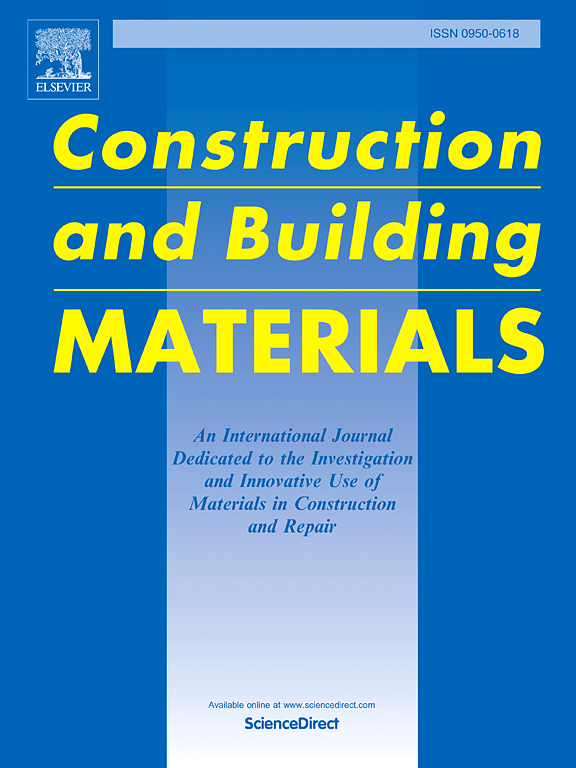多孔丝瓜纤维作为天然内固化材料在高强度砂浆中的应用
IF 8
1区 工程技术
Q1 CONSTRUCTION & BUILDING TECHNOLOGY
引用次数: 0
摘要
本研究探讨了可再生植物纤维作为内部固化(IC)材料的潜力,分析了其在高强度砂浆(HSM)应用中的潜力。在混凝土中加入不同体积比的丝瓜纤维的实验评估了其对自生收缩(AS)、机械性能和微观结构的影响。研究发现,添加丝瓜纤维可延长混合物的凝结时间,并在最终凝结后通过释放内部储存的水分继续水化反应。与对照组相比,丝瓜纤维显著降低了 AS,降幅高达 56.87%,这主要是由于丝瓜纤维的高吸水能力(211%)可减轻水泥水化过程中的内部毛细管压力。此外,加入丝瓜纤维对混凝土的机械性能也有显著影响:加入 1% 丝瓜纤维的混凝土在 28 天时的抗压强度比对照组提高了 7.6%;加入 2% 丝瓜纤维的混凝土在 28 天时的抗折强度最高,比对照组提高了 9.4%。微观结构分析表明,丝瓜纤维不仅能促进持续水化,还能增加水化产物的含量,提高水泥基质的密实度。总之,丝瓜纤维能有效降低 HSM 的 AS,提高其力学性能和微观结构,显示出改善混凝土性能的潜力。本文章由计算机程序翻译,如有差异,请以英文原文为准。
Application of porous luffa fiber as a natural internal curing material in high-strength mortar
This study explores the potential of renewable plant fibers as internal curing (IC) materials, analyzing their potential in high-strength mortar (HSM) applications. Experiments involving the incorporation of different volumetric ratios of luffa fiber into concrete assessed impacts on autogenous shrinkage (AS), mechanical properties, and microstructure. The research found that the addition of luffa fibers extended both the setting times of the mixture, and after final setting, continued the hydration reaction by releasing internally stored water. Compared to the control group, luffa fibers significantly reduced AS by up to 56.87 %, primarily due to their high-water absorption capacity (211 %), which mitigates the internal capillary pressures during the cement hydration process. Moreover, the inclusion of luffa fibers significantly affected the concrete's mechanical properties: a 1 % luffa addition enhanced the compressive strength at 28 days by 7.6 % over the control; concrete with 2 % luffa fiber exhibited the highest flexural strength at 28 days, showing a 9.4 % increase over the control. Microstructural analysis revealed that luffa fiber not only promoted continued hydration but also increased the content of hydration products and enhanced the compactness of the cementitious matrix. Overall, luffa fibers effectively reduce HSM’s AS and enhance its mechanical properties and microstructure, showing potential to improve concrete performance.
求助全文
通过发布文献求助,成功后即可免费获取论文全文。
去求助
来源期刊

Construction and Building Materials
工程技术-材料科学:综合
CiteScore
13.80
自引率
21.60%
发文量
3632
审稿时长
82 days
期刊介绍:
Construction and Building Materials offers an international platform for sharing innovative and original research and development in the realm of construction and building materials, along with their practical applications in new projects and repair practices. The journal publishes a diverse array of pioneering research and application papers, detailing laboratory investigations and, to a limited extent, numerical analyses or reports on full-scale projects. Multi-part papers are discouraged.
Additionally, Construction and Building Materials features comprehensive case studies and insightful review articles that contribute to new insights in the field. Our focus is on papers related to construction materials, excluding those on structural engineering, geotechnics, and unbound highway layers. Covered materials and technologies encompass cement, concrete reinforcement, bricks and mortars, additives, corrosion technology, ceramics, timber, steel, polymers, glass fibers, recycled materials, bamboo, rammed earth, non-conventional building materials, bituminous materials, and applications in railway materials.
 求助内容:
求助内容: 应助结果提醒方式:
应助结果提醒方式:


